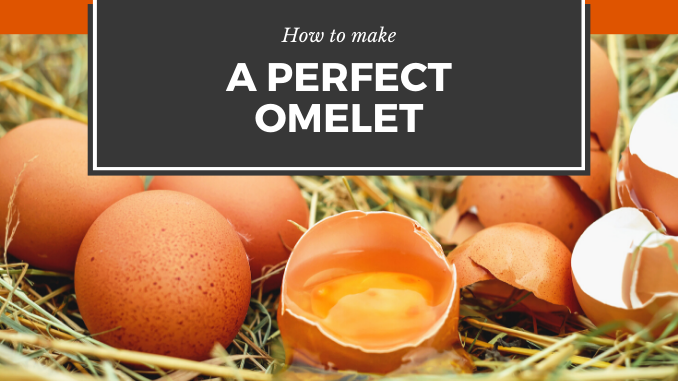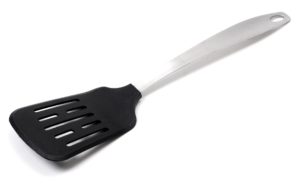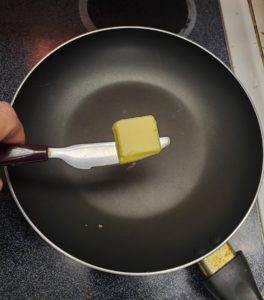
If you’re reading this, you’re probably wondering how to make a perfect omelet. Maybe even how to make an omelet, period.
Making an omelet isn’t the easiest thing in the world to do. It’s taken me a little time to get it right. But don’t fret–it’s by no means impossible.
How many eggs? Do I put milk in it? Cream? Sour cream? Do I flip it? Do I turn it over once or twice?
It was some trial and error. However, I make an omelet a few times a week now and I’ve gotten to the point where I achieve what I want every single time.
Step One: Get all the ingredients
The first thing you want to do before you worry about anything else is making sure you have what you need.

You will need:
- Spatula
- Frying Pan
- Fork
- Butter knife
- Butter
- Eggs
- Heavy whipping cream
- A decent-sized drinking cup
- Salt
- Pepper
- Any condiments you want to put in.
- A dinner plate
I’ll go over all these items in greater detail as we go along. A perfect creation for the animal-based eater.
Step Two: Frying Pan
Once you establish all your items, put your frying pan on the burner, turn the heat on medium for about five minutes. You’ll want a 12″ frying pan for this; either ceramic or cast iron will do fine. For me, this gives the perfect thickness for the base of your omelet–which is your egg.

While your pan is heating up, you’ll prepare the rest of your stuff.
Step Three: Eggs
Pull out four eggs, break all four into your drinking cup. I use large cage-free or free-range brown eggs. Large is a good size and readily available. The cage-free and free-range eggs are of better quality and taste than the more factory-produced counterpart, the white egg.
With your fork, break all four yolks, then whisk the eggs with the fork for about 15-20 seconds until solidly orange. Then add a dash of heavy whipping cream and whisk for about 20 seconds until the whole egg is a little less orange but all one color, and slightly frothy. The froth may take a minute to settle to the surface.

Set your cup with your eggs within an arm’s reach but don’t put them in the frying pan yet. You just want them handy for when you’re ready.
Step Four: Butter
By now, your frying pan on medium heat should be sufficiently warmed. The main point here is that you don’t start cooking your eggs on a cold pan.
With a butter knife, put one tablespoon of butter in the hot frying pan and spread it around with your spatula until butter evenly covers the surface of the pan. Then immediately pour the egg gently into the center of the pan until the cup is empty. Use your fork to scoop out some of the remaining egg from the cup into the frying pan.

For butter, I use the real thing. No margarine or “spread.” Kerrygold is my favorite brand and will give your omelet a nice twist.
Step Five: Salt and pepper
Grab your salt shaker and add some salt all over the surface of the egg. Not a huge amount, just a dusting. Do the same thing with your pepper.

This is key to flavoring your omelet. Don’t wait until your omelet’s finished to salt it. It’s just not the same.
Then add in any condiments with the exception of cheese. For condiments, I love bacon, ham, and mushrooms the most. Let them cook in with the egg as it cooks. Bacon bits out of a bag work fine as far as bacon goes. I used pepperoni because I had some on hand.

Step six: Flip
You’ll want to watch your omelet closely until most of the egg is cooked and the uncooked egg that’s left is just a few puddles on top of the cooked egg.
Use your spatula–the wider the better–to make sure your egg removes easily and sturdily from your frying pan.
Once that’s done and there’s only a little uncooked egg left, get your spatula up underneath the very center of the egg. You’ll want to lift the entire egg about five inches above the frying pan, and then do a quick flip counter-clockwise 180 degrees.
This will take some practice. If a little uncooked egg splashes onto the cooking surface or the stovetop, that’s OK. You can always clean that up once you’re done eating.
You’ll likely see a little bit of brown on your egg, and that’s OK.
Step seven: Finish the cooking
Now that your egg is flipped, now is the time to put any cheese in your omelet. Just add a handful of cheese evenly across the cooked egg. Add the cheese like you would a pizza, with no cheese within an inch or so of the edge of the egg. Let it sit for about 20 seconds. A little of the cheese will start to melt, but you don’t need most of it to melt.

Step eight: Fold
Now you can fold your omelet. Put your spatula on the right side of the egg, pick it up and flip it until the omelet is folded in half.

The butter will make this somewhat of a thick omelet, so folding it in thirds is just not prudent.
Step nine: Salt and eat
Add a little more salt and pepper to the surface of the omelet. I don’t generally put sauce, such as hollandaise, on top of my omelet, but if you want to add some sauce, now’s the time to do it.
The fork you used for whisking the eggs? Quickly wash that and use it to eat your omelet.
Voila! You’re all ready to rock and roll, and enjoy an absolutely delicious omelet.


Did you try this recipe? How did you like it? Do you have any of your own omelet ideas? Please comment in the box below.
This post may contain affiliate links. See Animalbasedlife.com’s Affiliates Disclosure here.

Leave a Reply